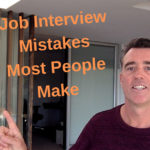Interview Question – Why Did You Leave Your Last Job?
Why did you leave your last job?
Or, if you’re still employed and looking for a new job then…
Why do you want to leave your current job?
Like any question an interviewer asks you, you need to be aware of what the employer is looking for when they ask you this.
Before you answer you need to think about what the employer wants to hear and what they don’t.
So having said that, here’s how best to answer this question…
When an interviewer asks you why you left your last job or why you want to leave your current position, be careful not to give them any red flags when you answer.
For example, even if you hated your job or your boss, or the company you worked for,
Don’t bad mouth them!
Be tactful with your answer.
You don’t know who the interviewer knows. They could be good friends with your previous boss or they may have even worked at the company.
And keep in mind, the interviewer doesn’t want to employ someone who they perceive may bad mouth THEM when they leave their company.
So don’t say you hated the job, or your boss, or that most of the people there were dopes, or that the money was woeful, or that the hours were terrible!
I’ve had people do this in an interview and it’s a turn off for the interviewer and the company they’re applying to.
Frame your answer in a way that puts a positive spin on it for the interviewer.
There are a few ways you can do this.
The first is to demonstrate how you’ve personally grown in the role. You could talk about the skills you learned on the job, then talk about how those skills will help you do a great job in the role you’re applying for.
Then you could suggest the reason you’re leaving is because there was no room for advancement.
This gives you a legitimate reason for applying for the role the interviewer has on offer.
The second could be that if you’ve been in your previous role a number of years, you feel it’s time to make a move and change roles.
A Legitimate reason for doing this is because you feel you’ve accomplished everything you can in your current role and you’re looking for a new challenge.
The third could be that you found it difficult to work with another employee at the company.
If you use this reason then you’ll need to expand a bit on why you couldn’t work with the employee, then make sure you satisfy the interviewer that this won’t happen at their workplace.
Be careful with this one. The interviewer will understand that some employees don’t get on and some can be very disruptive of others.
So if you use this make sure you cover why this was a one-of experience for you and it won’t happen at the interviewer’s workplace.
When an interviewer asks you why you’re leaving your current position, don’t feel like you need to lie.
Lies tend to get caught out so don’t do it.
So if you were retrenched from your previous role or were fired then don’t lie about it because the interviewer can easily reference check this with your previous employer and if they find you’ve lied then you definitely won’t get the job.
If you were retrenched then explain to the interviewer why.
A retrenchment is not your fault.
So explain what happened. You may have been part of a division of the company that was disbanded or you could have been one of the last people hired so one of the first to go.
Whatever the reason, it wasn’t your fault so make sure the interviewer understands the company’s decision on who to retrench was out of your hands, so was no fault of your own.
Then if possible, offer to give the interviewer the number of your previous manager, and reassure the interviewer that your previous manager will give you a great reference.
If you were fired from your previous role, you have 2 options-
But before I go through those, here’s an obvious point…
For the sake of your career it’s important you’re not fired from any position! If you think it’s coming then leave before it happens.
Being fired is a black mark on your career that can take a while to come back from so do whatever you can to avoid it.
So having said that,
The first way to deal with it in an interview is to meet it head on. This means bringing it up with the interviewer and then explaining why it happened.
The best way I’ve found to answer this is to deflect the reason away from bad performance to a change of circumstances with your previous employer.
For example, you could say that you were hired to do a certain role.
Then there was a change in company policy or direction that substantially changed your role and the new role you were required to do wasn’t consistent with your skills and experience.
The second is to not mention that you were fired. This could mean leaving the role you were fired from off your resume.
Some employers don’t check references so in this instance the fact you were fired won’t even come up.
However, assuming the interviewer does check references, you’ll need to give them a referee who will be positive about you.
So when you’re asked why you left your last role, keep in mind what the interviewer wants to hear, and think about how you’ll frame your answer before you’re asked it.
Why you left your last job is a question you’ll most likely be asked in every interview.
Remember, the easiest way to blitz an interview is to sit in front of an interviewer who already knows you’re a good match for the role. It means you’re already half way to securing the role.
And the way to do that is to use Connectzapp.
So get it from the app store or Google play or go to connectzapp.com and make your job hunting easy.
Remember to give this article a clap.
And as always…
Good luck with your job hunting!




